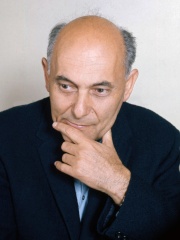
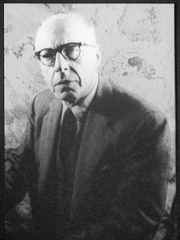
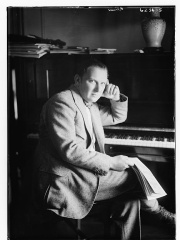
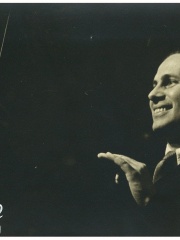
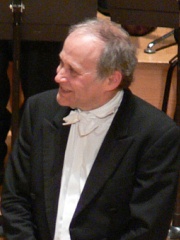
The Most Famous
CONDUCTORS from Hungary
This page contains a list of the greatest Hungarian Conductors. The pantheon dataset contains 128 Conductors, 6 of which were born in Hungary. This makes Hungary the birth place of the 8th most number of Conductors behind Finland, and Austria.
Top 6
The following people are considered by Pantheon to be the most legendary Hungarian Conductors of all time. This list of famous Hungarian Conductors is sorted by HPI (Historical Popularity Index), a metric that aggregates information on a biography's online popularity.

1. Georg Solti (1912 - 1997)
With an HPI of 65.62, Georg Solti is the most famous Hungarian Conductor. His biography has been translated into 40 different languages on wikipedia.
Sir Georg Solti ( jorj SHOL-tee, Hungarian: [ˈʃolti]; born György Stern; 21 October 1912 – 5 September 1997) was a Hungarian-British orchestral and operatic conductor, known for his appearances with opera companies in Munich, Frankfurt, and London, and as a long-serving music director of the Chicago Symphony Orchestra. Born in Budapest, he studied there with Béla Bartók, Leó Weiner, and Ernő Dohnányi. In the 1930s, he was a répétiteur at the Hungarian State Opera and worked at the Salzburg Festival for Arturo Toscanini. His career was interrupted by the rise of the Nazis' influence on Hungarian politics, and being Jewish, he fled the increasingly harsh Hungarian anti-Jewish laws in 1938. After conducting a season of Russian ballet in London at the Royal Opera House, he found refuge in Switzerland, where he remained during the Second World War. Prohibited from conducting there, he earned a living as a pianist. After the war, Solti was appointed musical director of the Bavarian State Opera in Munich in 1946. In 1952, he moved to the Oper Frankfurt, where he remained in charge for nine years. He took West German citizenship in 1953. In 1961, he became musical director of the Covent Garden Opera Company, London. During his 10-year tenure, he introduced changes that raised standards to the highest international levels. Under his musical directorship, the status of the company was recognised with the grant of the title "the Royal Opera". He became an honorary citizen of the coastal holiday town of Castiglione della Pescaia, and a British citizen in 1972. In 1969, Solti became music director of the Chicago Symphony Orchestra, a post he held for 22 years. He conducted many recordings and high-profile international tours with the orchestra. Solti relinquished the position in 1991 and became the orchestra's music director laureate, a position he held until his death. During his time as the Chicago Symphony Orchestra's eighth music director, he also served as music director of the Orchestre de Paris from 1972 until 1975 and principal conductor of the London Philharmonic Orchestra from 1979 until 1983. Known in his early years for the intensity of his music making, Solti was widely considered to have mellowed as a conductor in later years. He recorded many works two or three times at various stages of his career, and was a prolific recording artist, making more than 250 recordings, including 45 complete opera sets. The best-known of his recordings is probably Decca's complete set of Richard Wagner's Der Ring des Nibelungen, made between 1958 and 1965. Solti's Ring has twice been voted the greatest recording ever made, in polls for Gramophone magazine in 1999 and the BBC's Music Magazine in 2012. Solti was repeatedly honoured by the recording industry with awards throughout his career. From 1963 to 1998, he won 31 Grammy Awards as a recording artist, making him the Grammy Awards' most-awarded artist until Beyoncé surpassed his record in 2023.

2. George Szell (1897 - 1970)
With an HPI of 62.89, George Szell is the 2nd most famous Hungarian Conductor. His biography has been translated into 29 different languages.
George Szell (; June 7, 1897 – July 30, 1970), originally György Széll, György Endre Széll, or Georg Szell, was a Hungarian-born American conductor, composer and pianist. Considered one of the twentieth century's greatest conductors, he was music director of the Cleveland Orchestra of Cleveland, Ohio, and recorded much of the standard classical repertoire in Cleveland and with other orchestras. Szell came to Cleveland in 1946 to take over its respected if undersized orchestra, which was struggling to recover from the disruptions of World War II. By the time of his death he was credited, to quote the critic Donal Henahan, with having built it into "what many critics regarded as the world's keenest symphonic instrument." Through his recordings, Szell has remained a presence in the classical music world long after his death, and his name remains synonymous with that of the Cleveland Orchestra. While on tour with the Orchestra in the late 1980s, then-Music Director Christoph von Dohnányi remarked, "We give a great concert, and George Szell gets a great review."

3. Fritz Reiner (1888 - 1963)
With an HPI of 62.69, Fritz Reiner is the 3rd most famous Hungarian Conductor. His biography has been translated into 25 different languages.
Frederick Martin Reiner (Hungarian: Reiner Frigyes; December 19, 1888 – November 15, 1963) was an American conductor of opera and symphonic music in the twentieth century. Hungarian born and trained, he emigrated to the United States in 1922, where he rose to prominence as a conductor with several orchestras. He reached the pinnacle of his career while music director of the Chicago Symphony Orchestra in the 1950s and early 1960s.

4. Antal Doráti (1906 - 1988)
With an HPI of 61.70, Antal Doráti is the 4th most famous Hungarian Conductor. His biography has been translated into 22 different languages.
Antal Doráti (UK: , US: , Hungarian: [ˈɒntɒl ˈdoraːti]; 9 April 1906 – 13 November 1988) was a Hungarian-born conductor and composer who became a naturalized American citizen in 1943.
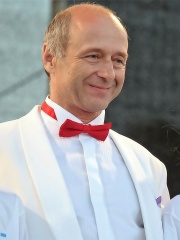
5. Iván Fischer (b. 1951)
With an HPI of 60.14, Iván Fischer is the 5th most famous Hungarian Conductor. His biography has been translated into 17 different languages.
Iván Fischer (born 20 January 1951) is a Hungarian conductor and composer.

6. Ádám Fischer (b. 1949)
With an HPI of 57.70, Ádám Fischer is the 6th most famous Hungarian Conductor. His biography has been translated into 15 different languages.
Ádám Fischer (born 9 September 1949 in Budapest) is a Hungarian conductor. He is the general music director of the Austro-Hungarian Haydn Orchestra, chief conductor of the Danish Chamber Orchestra, and principal conductor of the Düsseldorf Symphony Orchestra.
People
Pantheon has 6 people classified as Hungarian conductors born between 1888 and 1951. Of these 6, 2 (33.33%) of them are still alive today. The most famous living Hungarian conductors include Iván Fischer, and Ádám Fischer. The most famous deceased Hungarian conductors include Georg Solti, George Szell, and Fritz Reiner.
Living Hungarian Conductors
Go to all RankingsDeceased Hungarian Conductors
Go to all RankingsGeorg Solti
1912 - 1997
HPI: 65.62
George Szell
1897 - 1970
HPI: 62.89
Fritz Reiner
1888 - 1963
HPI: 62.69
Antal Doráti
1906 - 1988
HPI: 61.70
Overlapping Lives
Which Conductors were alive at the same time? This visualization shows the lifespans of the 4 most globally memorable Conductors since 1700.

